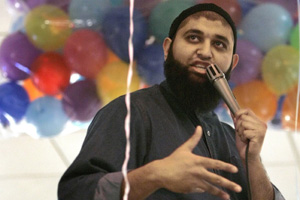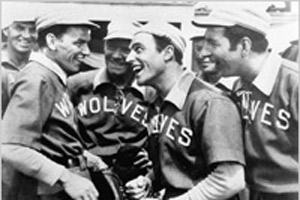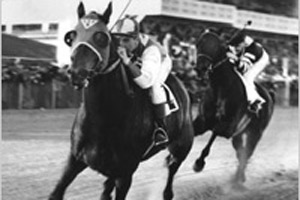Focus on America
No Joke! Stand-up Comedians Battle Intolerance

A Muslim, a Christian, a Jew, a Hindu and a Sikh walk into a hotel ballroom. The opening line of a joke?
No, but in this case it was the start of a full evening of stand-up comedy aimed -- its creators say -- at easing religious tensions through laughter "and a healthy dose of political incorrectness."
Titled "Make Chai, Not War," the event was the brainchild of two Indian-American comics, Azhar Usman and Rajiv Satyal. It grew out of a two-man comedy show previously mounted by the Muslim Usman and Hindu Satyal.
Usman says they conceived of that earlier show based on their concern over the "heightened tensions between those two religious groups in the [South Asian] subcontinent…. To bring Hindu and Muslim together for a comedy showcase, we thought, was a really good idea."
They then “pitched each other” on the idea of adding comics of other religions to the bill, Satyal says.
The result was the April 25 event at the Hilton Arlington (Virginia) Hotel near Washington. For that show, they recruited three more Indian-American comics: Paul Varghese, a Christian; Harvin Sethi, a Sikh; and Samson Koletkar, who bills himself -- without serious fear of contradiction -- as “the world’s only Indian Jewish comedian.”
To push the diversity theme one step further, they added a George Washington University freshman, Nigerian-American Madebo Fatunde, as a warm-up act.
While Usman is sure “the show can have a broader appeal,” the evening’s audience seemed mostly young and roughly evenly divided between Pakistani Americans and Indian Americans -- groups that have become increasingly numerous in the Washington metropolitan area -- with just a smattering of whites, Asian Americans and African Americans.
That made the audience particularly receptive as the comics played off not so much their religious differences, but rather the stereotyped ethnic similarities they share with each other and much of the audience.
Their listeners responded appreciatively as they told anecdotes that poked gentle fun at South Asian foibles: from a father’s problems with English pronunciation, to difficulties being on time (“We are a people who use the same word for yesterday and tomorrow,” Usman observed), to perceived frugality and even personal grooming issues.
By offending everyone equally, they seemed to offend no one. The audience laughed at the observational humor -- and even louder when the comics occasionally emphasized a point by using a Hindi or Urdu word.
Stories about being "cheap" seemed especially numerous and popular. Varghese drew roars of laughter when he told of his father’s adventures at an airline counter: offered an upgrade for $100, he asked for a downgrade instead. “How about you give me $100, and I stand?” Varghese quoted him.
Asked whether the “Make Chai” showcase reflects a commitment to diversity or is simply a gimmick, Usman acknowledged that the answer is probably mixed. “Some of the comics have a deep commitment to interfaith and bringing communities together. For others, it’s probably just another gig,” he said, adding that he puts himself in the deeply committed category.
Usman tours with a successful all-Muslim comedy group, “Allah Made Me Funny.” He also has played dozens of college venues with a rabbi as his comedy partner. (See “Humor Helps Break Stereotypes About Muslims.”)
The Chicago-born Usman, 32, said he shifted into stand-up from a budding career as a lawyer.
Satyal, also 32, from Cincinnati, is an engineer by training. He began his stand-up career while working in marketing for the Cincinnati-based Procter & Gamble Company.
“Make Chai,” he said in an interview, is “based upon something that’s important to me: multiculturalism and diversity.” Those are exemplified in South Asia, he said; the divisive passions that still exist are real, “but for the most part, you’ve got over a billion people who live awfully close to each other. … I think it’s pretty impressive that they have relative peace.”
In his act, he said, “I try to make statements to push people a little bit out of their comfort zones. I think that helps us to open up the dialogue and the debate. … We’re not here to make fun of religions or cultures. We’re here to stand on the stage as brothers and say, ‘Hey, it’s OK for us to talk about this stuff.’”
The show’s multiculturalism is underlined by its 19-year-old, Northern Virginia Community College-student promoter, Raakin Iqbal. Born in Alexandria, Virginia, to Indian and Pakistani parents, Iqbal started in show business at age 15 as a disc jockey at family functions. He has developed into a one-man conglomerate; his Huqa Entertainment provided event management for the show and his Raakin Iqbal Productions produced it.
Iqbal already is laying plans to take “Make Chai” on international tour -- possibly to Pakistan, India and the United Arab Emirates, for starters -- late in 2008.
Usman and Satyal see that as a realistic possibility.
“We believe there’s a definite international appeal,” Usman said. With South Asians dispersed around the English-speaking world, the niche audience exists.
Moreover, he added, “this show can have a broader appeal. We’re talking to promoters in the United Kingdom and around the world.”
Recently on Focus on America
Kansas City Celebrates Its Legacy of Jazz
 Kansas City Celebrates Its Legacy of Jazz
Kansas City Celebrates Its Legacy of Jazz
American Jazz Museum attracts visitors from around the world
Traditional Baseball Song Turns 100
 In the spring of 1908, songwriter, singer and vaudeville performer Jack Norworth was riding a subway in New York when he caught sight of a sign: “Baseball Today – Polo Grounds.”
In the spring of 1908, songwriter, singer and vaudeville performer Jack Norworth was riding a subway in New York when he caught sight of a sign: “Baseball Today – Polo Grounds.”
Sports Films Celebrate American Brand of Perseverance
 Washington -- Like a crucible, sports turns up the heat under its participants to burn off the dross -- not only of their athletic imperfections, but often of their character. For many years, American sports films have focused on the never-say-die spirit that emerges from the competitive fires as pure gold.
Washington -- Like a crucible, sports turns up the heat under its participants to burn off the dross -- not only of their athletic imperfections, but often of their character. For many years, American sports films have focused on the never-say-die spirit that emerges from the competitive fires as pure gold.